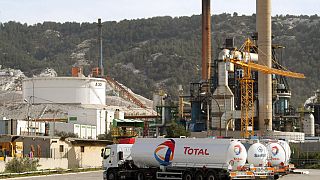Nigeria
French energy giant TotalEnergies is ready to invest $6 billion (around €5.5 billion) over several years in Nigeria's energy industry, particularly in gas and offshore projects, the Nigerian presidency has said.
"We are ready to invest $6 billion over the next few years. We are looking in depth at more opportunities for deepwater and gas production," said TotalEnergies CEO Patrick Pouyanné, according to a presidential statement.
On Monday, Head of State Bola Ahmed Tinubu held talks with Mr Pouyanné in Abuja, the capital.
"Everything is in place. We just need to finalise the adjustments and changes needed to unlock the exceptional potential in oil and gas", continued Mr Pouyanné, according to the Presidency.
Nigeria is "very important" for TotalEnergies, which accounts for between 8% and 10% of the group's total oil production, according to the CEO quoted in the press release.
For his part, the Nigerian president pledged to "remove all obstacles in the oil and gas industry". "We are ready to work with you", he said.
The oil and gas major indicated that it "has a substantial portfolio of projects that could represent 6 billion dollars of investment over the next few years".
Ten days ago, the Nigerian president's office announced similar commitments from British oil and gas giant Shell, for USD 6 billion in offshore, natural gas and liquefied natural gas (LNG) projects.
Since his inauguration at the end of May, Bola Ahmed Tinubu has taken a series of economic measures aimed at attracting more foreign investment to this oil-producing country and member of OPEC.
A law, the Petroleum Industry Bill, adopted in 2021 after years of debate and delays, was already aimed at attracting more foreign investment in the oil sector through changes to regulations, royalties and taxes.
Nigeria has seen its oil production decline in recent years due to widespread pipeline theft, attacks, high operating costs and red tape, which have deterred investors.













11:08
Can Africa’s soil sustain food security? [Business Africa]
01:05
Niger signs deal to supply Mali with cheaper diesel
01:09
Nigeria sees record inflation in March
02:24
Zimbabweans forced to use US dollar in absence of new currency ZiG
00:50
Nigeria recovers millions in corruption probe at key ministry
01:14
Poll shows Egypt's March inflation figures expected to edge upwards